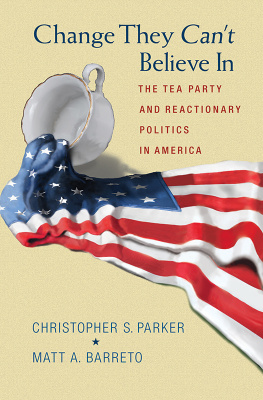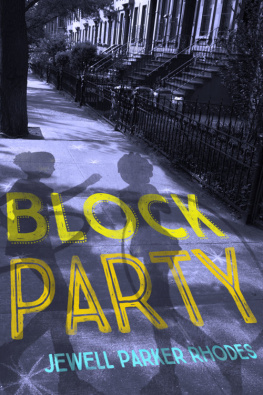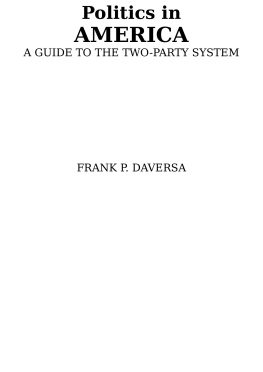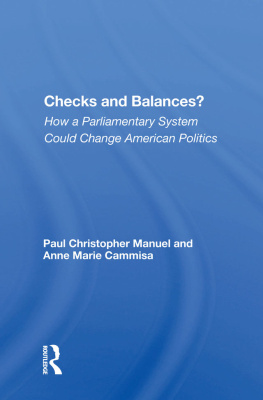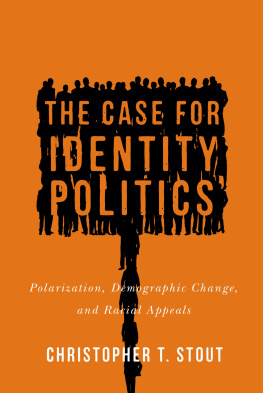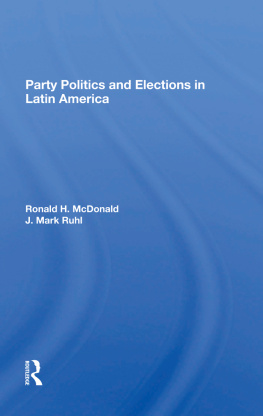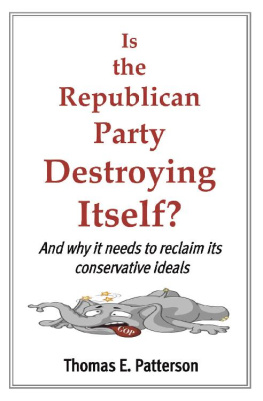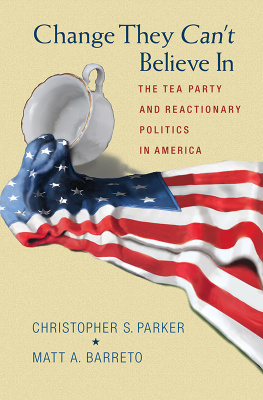Copyright 2013 by Princeton University Press
Published by Princeton University Press, 41 William Street, Princeton, New Jersey
08540
In the United Kingdom: Princeton University Press, 6 Oxford Street, Woodstock, Oxfordshire OX20 1TW
press.princeton.edu
Book designed by Marcella Engel Roberts
All Rights Reserved
Library of Congress Cataloging-in-Publication Data
Parker, Christopher S., 1963
Change they cant believe in : the Tea Party and reactionary politics in America / Christopher S. Parker and Matt A. Barreto.
pages cm
Includes bibliographical references and index.
ISBN 978-0-691-15183-0 (hardcover)
1. Tea Party movement. 2. Political participationUnited StatesHistory21st century. 3. Government, Resistance toUnited StatesHistory21st century. 4. Protest movementsUnited StatesHistory21st century. I. Title.
JK2391.T43P37 2013
322.4'40973dc23
2012046763
British Library Cataloging-in-Publication Data is available
This book has been composed in Sabon LT Std, and Helvetica Neue LT Std
Printed on acid-free paper.
Printed in the United States of America
13579108642
PREFACE AND ACKNOWLEDGMENTS
T HIS BOOK BEGAN ACCIDENTALLY. After promotion, Parker designed what he thought would make an ideal survey on race and politics. By happenstance, the survey coincided with the brewing controversy surrounding what has come to be known as the Affordable Care Act (aka Health Care Reform), when the Tea Partys resistance made national (and international) headlines. Barreto thought it a good idea to ask a question about the extent to which people supported the Tea Party. This was January 2010. Two months later, Tea Party supporters marched on Washington to oppose the bill, during which derogatory posters of President Obama were on display for all to see. Even as the Tea Party claimed their efforts were aimed at shrinking government and restoring fiscal responsibility, their critics charged them with racism. Much has been written about the Tea Party. However, this book departs from many others in at least one important way: it draws on social science as a means to adjudicate the above-mentioned claims and counterclaims about the motivations of the Tea Party, and the ways in which they affect contemporary American politics.
As any honest author will tell you, writing a book forces one to incur many, many debts. Its no different in this case. This manuscript has benefited from the comments of the following colleagues: Alan Abramowitz, Christopher Adolph, Shaun Bowler, Devin Burghart, Tony Chen, Karam Dana, Michael Dawson, Christopher Federico, Luis Fraga, Zoltan Hajnal, Ashley Jardina, Jose Marichal, Peter May, Naomi Murakawa, Spencer Piston, Gabriel Sanchez, Mark Sawyer, Lee Scheingold, David Smith, Mark Smith, Jack Turner, and Janelle Wong.
Preliminary results were presented at a number of institutions. Ultimately, the book benefited from spirited discussions at the following universities: Michigan, Minnesota, Oregon, Southern California, California-Berkeley, CaliforniaSanta Barbara, Emory, and Stanford. The workshop participants at each place provided timely feedback. Wed like to thank Vince Hutchings, Joe Lowndes, Jane Junn, Cynthia Kaplan, Michael Leo Owens, and Gary Segura for the invitations.
At Margaret Levis invitation, Parker also presented the research in Australia at the University of Sydney and Australian National University. Workshop participants were both vigorous and generous with their comments at each stop.
We would also like to recognize the hard work of several people at the University of Washington who contributed to this project. Christopher Towler and Betsy Cooper supervised the three surveys conducted through the Survey Research Lab at the University of Washington. Other residents of the Washington Institute for the Study of Sexuality, Ethnicity, and Race (WISER) also contributed, including Francisco Pedraza, Loren Collingwood, Rachel Sanders, Benjamin Gonzales, Kiku Huckle, Sergio Garcia-Rios, and Kassra Osskooii. Parker would also like to thank Towler (again), as well as Rachel North, a precocious undergraduate. These folks logged long hours and provided exceptional research assistance down the stretch. Steve Dunne, our tech guy, kept the servers humming in the survey lab, and Ann Buscherfeld was a big help on the administrative side. Finally, the UW-based Royalty Research Grant provided financial assistance.
We remain indebted to Chuck Myers, our editor at Princeton. He championed the project from the start, shepherding it through the process with ease. Chuck also deserves credit for selecting excellent reviewers.
Beyond the many colleagues who we have acknowledged already, we also wish to thank our families for their unwavering support during the long process of finishing this manuscript. Barreto would like to thank his parents, Kathy and Guillermo Barreto, and his children, Dan and Clara Barreto. Most of all, he would not have been able to complete this project without the love and support of his wife, Julie Straub-Barreto, who went above and beyond in everything he could ask. He would like to dedicate this book to her.
Parker would like to thank his teachers at San Diego City College, especially Dr. Candace Waltz. He would also like to acknowledge the patience, support, and love of his daughters, Brittani and Bryanna Parker, and even the family pet, Daisy. He now has more time to spend with them. Finally, this book is dedicated to his late cousin and longtime UCLA official, Dr. Winston Churchill Doby, who continues to show him the way.
Change They Cant Believe In
Introduction
Who Is the Tea Party and What Do They Want?
F ROM THE BEGINNING, the Tea Party movement, as a loose confederation of leaders, activists, and sympathizers, has said its about conservative principles: small government, the free market, and governmental fiscal responsibility. On February 26, 2011, at a Tea Party gathering in Portland, Oregon, a thoughtful Tea Party spokesman was heard quoting the famous French social observer Alexis de Tocqueville on liberty, and recommending the audience read Frederick von Hayeks well-known paean to small government, The Road to Serfdom. In his address to the audience in the Shiloh Inns ballroom, Rob Kuzmanich averred, Conservatives are trying to conserve the liberating ideas of the American Revolution [that while] we retain our moral values, the Tea Party unites around three principles: limited government and the rule of law, free-market capitalism, and fiscal and personal responsibility. The Tea Party slogan is No public money for private failure.
The contrast between the two meetings is striking. The first, consistent with the now familiar retronym the party has adopted, Taxed Enough Already (TEA), speaks to the symbolic nature of its opposition to big government. More to the point, as political scientists Theda Skocpol and Vanessa Williamson argue, invoking the Tea Party calls forth images of the original American colonial rebels opposing tyranny by tossing chests of tea into Boston Harbor.

